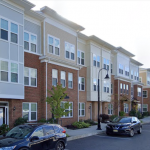New Jersey Future Blog
The Future of Housing in New Jersey
November 30th, 2023 by New Jersey Future staff
The following feature was originally published in the November 2023 edition of NJ Municipalities Magazine, which has been relied upon by local government leaders, department heads and administrators for over 100 years. NJ Municipalities is read by over 6,000 readers each month. You can read an online version, or view the pdf of the print edition.
By Chris Sturm and Michael Atkins
Housing shapes communities while communities shape the quality of life and access to opportunities for each of us. Local officials are on the front lines of housing development, shaping what kind of housing gets built, where it can be constructed, and the local roads and sidewalks residents use to get from their homes to everywhere else. Municipalities have the authority to adopt land use plans, set zoning codes, and create redevelopment areas and parking maximums that facilitate high quality places. Municipalities and counties have the transportation teams to design, pave, and maintain the streets and sidewalks that create the character of a community and determine if it is welcoming and safe for all users. If “home is where the heart is”, then housing is at the heart of a strong and inclusive New Jersey.
But the external challenges facing local leaders have become more complicated and more intense. The COVID-19 pandemic and climate change in particular have exacerbated the pressing issues of escalating housing costs, pedestrian safety, displacement of lower-income people, empty office space, and flooding, to name a few. Recent economic turmoil due to the pandemic only amplified these pressures—first demand and inflation drove up housing prices, and now high interest rates have made mortgage financing increasingly difficult.
As a nonprofit organization focused on land use and smart growth, New Jersey Future works to help communities emerge strong from crises. And together with many partners—including local and state government, developers, community activists, and environmentalists—we see housing as not only the center of much debate but as an important lever to advance strong, healthy, resilient communities for everyone.
Center-based housing development
Towns and cities that encourage a range of housing types in walkable neighborhoods and centers aren’t just revitalizing town and city centers for aesthetics. Successful downtowns and centers are converting abandoned strip malls, vacant shops, and empty office space to new housing, which provide municipalities with more reliable, steady, tax revenues, often without adding the costs of new students to their school district. The result is stronger tax ratables and dynamic live-work-shop places where residents enjoy local restaurants, parks and theaters. Towns should not overlook the benefits of providing mixed-use centers to their local residents, and enabling their residents to host friends and family at their favorite places to promote even further commercial activity.
Center-based housing development supports long-time residents as they undergo changes in life, but seek to remain close to their personal networks that provide them fulfilling opportunities to live full and meaningful lives. Consider empty nesters looking to downsize from their single-family home to age in place, and newly separated parents who want to continue to live in the same school district that their children attend. While occupancy rates for office and retail space have been weakened by post-pandemic hybrid work schedules and online shopping, the demand for center-based housing is robust, and growing as new generations, primarily Millennials and Gen Z, seek to live close to family, but with a modicum of urbanity to facilitate their hobbies and interests. Towns and cities that plan and zone for center-based housing create options for their community members undergoing life transitions, without forcing them to relocate.
Walkable places with a mix of housing and services simplify the way residents get between home, pick up their children from school, and make it to their next doctor’s appointment. Smartly designed, compact town and city centers can reduce commute times and allow people to accomplish multiple tasks within one trip, ideally returning time back to people by freeing them from commuting long distances in their private vehicles and sitting in traffic congestion.
Attainable housing
Rising costs of housing in New Jersey are a significant driver of the growing affordability crisis in the state. A 2021 Rutgers-Eagleton poll “found that 90% of New Jerseyans are worried about the cost of housing in the state, with 55% considering it a “very serious” problem.” It’s in New Jersey’s best interest economically, socially, and environmentally for our local leaders to provide stable and lower-cost housing options in their communities, so the state as a whole is more affordable. New Jersey’s high cost of housing has long had an impact on the state’s “brain drain”, the migration of highly educated individuals out of the state, due to the lack of housing access.
Developing additional housing also eases pressures on lower-income households. In the absence of new development or quality redevelopment, affluent households will outcompete lower-income households, fueling gentrification and triggering displacement of long-time residents. Housing affordability is not just about out-migration or displacement though. It raises basic quality-of-life questions like: What could households do with an additional $100 a week? What would commuters do with an additional two or three hours back in their lives?
Too many hard-working residents are unable to rent, let alone buy, in the communities in which they work. Teachers, healthcare professionals, and service workers of every variety, are commuting longer, often in their private automobile, to their places of work. “Across the state, municipalities that facilitate solutions to promote sustainable housing opportunities for all workers will see a ripple of positive effects for their communities,” observed Montclair Mayor Sean Spiller, who also serves as president of New Jersey Educators Association. “Making sure educators, and educational support professionals, and their families are able to live in the communities they serve if their circumstances allow, is a win-win for educators, students, and communities as a whole,” Spiller continued. “Aside from policies that fairly compensate hard working, vital public servants, like educators, New Jersey cities and towns should think holistically about the benefits of promoting diversity and sustainability within their communities, and as we’ve done in Montclair, take legislative action to achieve and preserve that diversity.”
Climate change and housing
The manner in which we build new and improve existing housing must assist in our broader climate change mitigation and adaptation efforts. New developments must be sited out of flood zones to foster resilience, safeguard public health and minimize property damage. They can be designed to reverse our mismanagement of stormwater. Sprawling developments, big box stores, and highly-developed downtowns have laid vast impermeable surfaces across our state. Rainwater runs off of these surfaces, pollutes our water supplies, and flooding worsens. Today, new development and conscientious redevelopment is beginning to rectify this issue by installing green infrastructure facilities like street trees, bioswales, and rain gardens. Municipalities can not only comply with new state regulations for stormwater management, they should embrace and encourage them as vital tools to address a growing risk.
Finally, compact densities can reduce car dependency, shorten trips, cut emissions, and improve air quality. By building a network of places well-linked by public transportation, we can ensure that New Jersey has its best foot forward and is ready to face the challenges of climate change with minimal loss of lives or property values.
The future of housing in New Jersey
Since its formation in 1987, New Jersey Future has steadfastly advocated for center-based development and smart redevelopment projects in accordance with our statewide goals of balancing development and preservation and spurring equitable economic growth. While we have had an eye to statewide progress, it is local municipal leaders and planners who have the tools and powers to encourage development and redevelopment that can deliver more housing that is affordable, inclusionary, climate resilient and located in walkable, people-oriented centers that increase commercial activity and improve public health.
But local community planning and zoning is tricky and complicated. Even as we celebrate local success stories (see this year’s Smart Growth Award winners in the sidebar), we know municipal leaders often struggle to redevelop and add housing supply to our already dense and well-connected state. Many of our partners in government, nonprofit, and the private sector are likewise interested in identifying and constructing solutions out of the current crunch.
Over the coming months, New Jersey Future will be convening partners and stakeholders to envision future housing development in our state that is equitable, affordable, resilient, and diverse. Through a collaborative process we seek to identify practical, actionable steps to get there including everything from understanding and elevating municipal needs, to state planning and policy, to partnering with low and moderate-income residents. We encourage readers to stay tuned as New Jersey Future and its partners work together on a set of solutions and publicize our findings in Spring 2024.
To inform that conversation, New Jersey Future is circulating a simple survey to collect the perspectives of municipal leaders, community members, planners, architects, and developers. We invite you to take 10 minutes or less and share your thoughts on the pressures, successes, and challenges you and your town are facing as we confront this together. Survey available online.
Related Posts
Tags: Affordable housing, center-based housing, climate change, Housing, housing and equity, housing costs
















